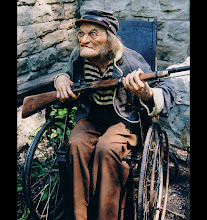
Speaking of the local theatre scene, it has been a pretty active summer in Houston. This weekend sees the closing of Mildred's Umbrella production of Last Easter and Texas Repertory Theatre Company's Thoroughly Modern Millie. Also playing this weekend are The Catastrophic Theatre's Tamarie Cooper Show, The 10 x 10 festival at Country Playhouse, The Freneticore Fringe Festival, and the Bootown's Grown-Up Storytime on Tue. night. I'm sure I'm leaving someone out, and I'm not even mentioning the big kids. This is a huge, eclectic community of artists that Houston audiences are supporting. Granted, there could always be more support and it would be good to see more new faces in the audience and more crossing over of audiences. But there is a diversity present in the theatre community here that we should collectively celebrate; so many different theatres serving so many different audiences. I wish I had the time and the money to see everything, but alas, I have none of the former and little of the latter. I always get confused as to which is which on the former and latter thing, but it works either way.
I hope that there is room in this crowded collective for us to find a niche. Ideally, we want to produce shows that challenge audiences, but we don't want to drive them away. There was a time that I only wanted to do work so confrontational that the ultimate success would be to drive the audience to flee the theatre in indignation and rage. But where would it go from there? Unless one could come up with some ultimate message, one that an audience would only need to hear once and have their lives forever changed, what's the point in driving them away? It seems to be the equivalent of calling someone Nazis or Fascists in an argument: it ends the dialogue immediately and invalidates any point that follows. So it is a fine line that must be walked. Confront the audience, make them consider something they may not want to, but entice them to make the consideration.

Doorman is striving to work following the philosophy and ideas put forth by Howard Barker. Whereas many playwrights wish for a single shared, collective response from the audience, Barker believes a fragmented response is ideal. We shouldn't work to manipulate an audience. We should simply present the actions on the stage and let the observers take from it what they will.
"To chant together, to hum banal tunes together, is not collectivity."
-Howard Barker
Barker coined the term "Theatre of Catastrophe" for his brand of theatre and these are the principles we work with (unless we break them, in which case we probably meant it in an ironic way, which would violate the rules anyway unless we...forget it. We just admire the dude.) We hope to continue what Barker set forth as well as evolve with his ideas and develop our own tradition. If there is one thing I hope everyone takes from this it is this idea: come see our show. Seriously. I'll get you some Teddy-Grahams, and an EctoCooler. Just come. Rant over.



"So it is a fine line that must be walked. Confront the audience, make them consider something they may not want to, but entice them to make the consideration."
ReplyDeleteI'm battling this right now. Shit, I battle this always.
I'd go with some penetration. That seems to work.
ReplyDeleteTheatre of Catastrophe FTW!!!
ReplyDelete